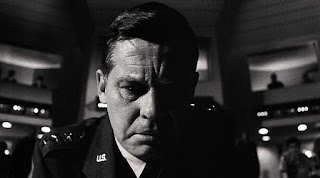 |
| Schell and Mastroianni |
Mario (Marcello Mastroianni). a lonely man in Livorno, meets Natalia (Maria Schell), who tells him that she is waiting patiently any day now for a lover (Jean Marais of Fantomas) who swore he would return to her in one year. Mario can't believe Natalia can actually think that her lover will come back, and he pursues a romance with her even as she ponders her future with her lover and finds herself drawn to Mario in spite of herself. Mario promises to deliver a letter to the man in question to see if he still feels the same about Natalia, but will he actually follow through? ... Le notti bianchi is a little gem of a movie, beginning with an exquisite theme by Nino Rota, and taking place on beautifully designed sound stages in Cinecitta. The camera roams all over these impressive sets even as a sad older woman (Clara Calamai of Deep Red), an aging prostitute who has a yen for Mario herself, roams through the city. Despite the fact that Mastroianni is miscast -- his actions and dialogue are those of a younger man, and he is much more sophisticated in appearance than his character -- he is still superb, delineating all of Mario's passion, yearning, and inner torment with great skill. Schell is also quite good, as are Marais and Calamai and the actors who play Natalia's nearly-blind grandmother (Marcella Rovena) and her tenants. Giuseppe Rotunno's cinematography is marvelous, as is Rota's sensitive scoring. The film, based on a short story by Dostoevsky, has an uncompromising and moving finale. A strange scene has Mario and Natalia encountering an entire family, including a small child, apparently living under a bridge in the middle of winter, but neither of them remark upon it. There is a fairly long sequence in a club with Mario and Natalia joining in when everyone, including a snappy dancer named Dirk Sanders, begins gyrating to Bill Haley and the Comets' "Thirteen Women." This is an abrupt change in tone, but it works. Visconti also directed the notable Bellissima and many others.
Verdict: Exactingly-made, dream-like and hauntingly beautiful. ***1/2.

























